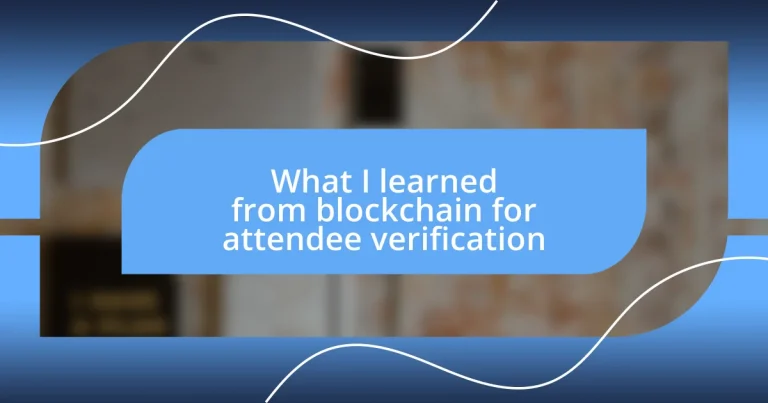Key takeaways:
- Blockchain technology enhances trust and security in verification processes through transparency, immutability, and decentralized consensus mechanisms.
- Implementing blockchain in events significantly improves efficiency, reduces waiting times, and enables personalized attendee experiences.
- Challenges in blockchain adoption include the learning curve, scalability issues, and concerns over data privacy, highlighting the need for education and transparent communication.
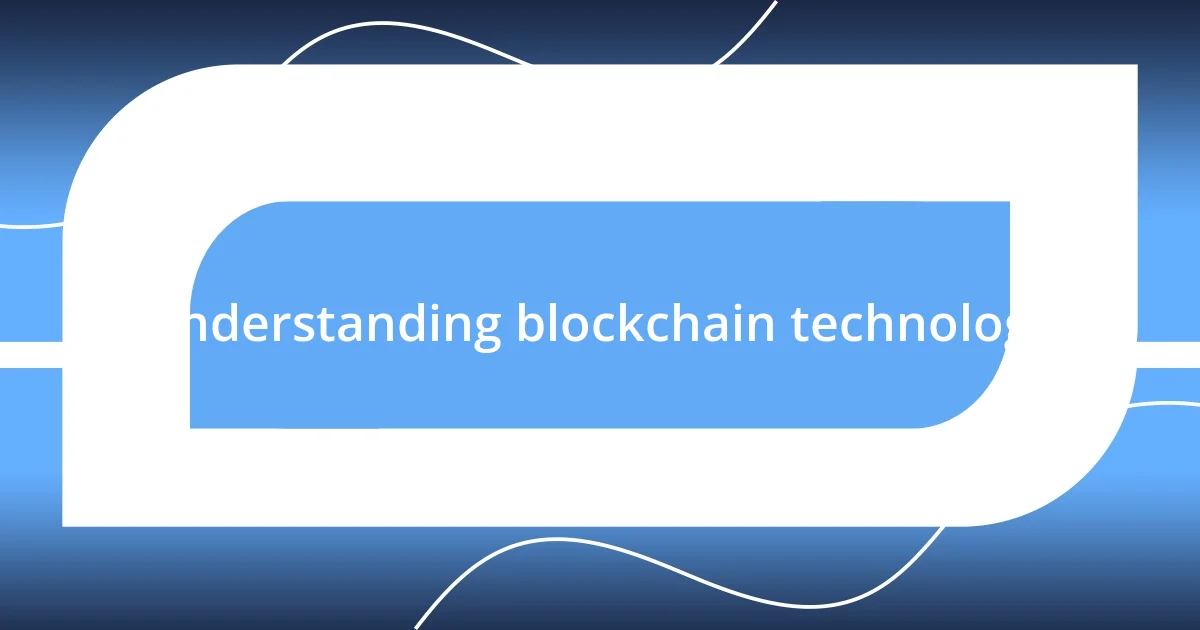
Understanding blockchain technology
Blockchain technology is fascinating because, at its core, it functions as a decentralized ledger. Imagine a digital notebook that everyone can see but no one can alter; this simple yet revolutionary concept ensures transparency and security. When I first wrapped my head around it, I felt a mix of awe and confusion—how could something so intricate be so straightforward?
One of the most compelling aspects of blockchain is its immutability. Once a piece of data is recorded, it’s nearly impossible to change or delete it. I remember the excitement I felt when I realized how this feature could drastically reduce fraud, especially in areas like attendee verification. It makes you wonder, doesn’t it? How different our systems would be if we could trust every record as unchangeable.
Moreover, the consensus mechanisms used in blockchain provide an added layer of security. They require multiple parties to agree on the validity of transactions before they’re added to the chain. Reflecting on this, I can’t help but think about how this collaborative approach could reshape trust in digital interactions. Isn’t it uplifting to envision a future where verification is built on shared responsibility and consensus?
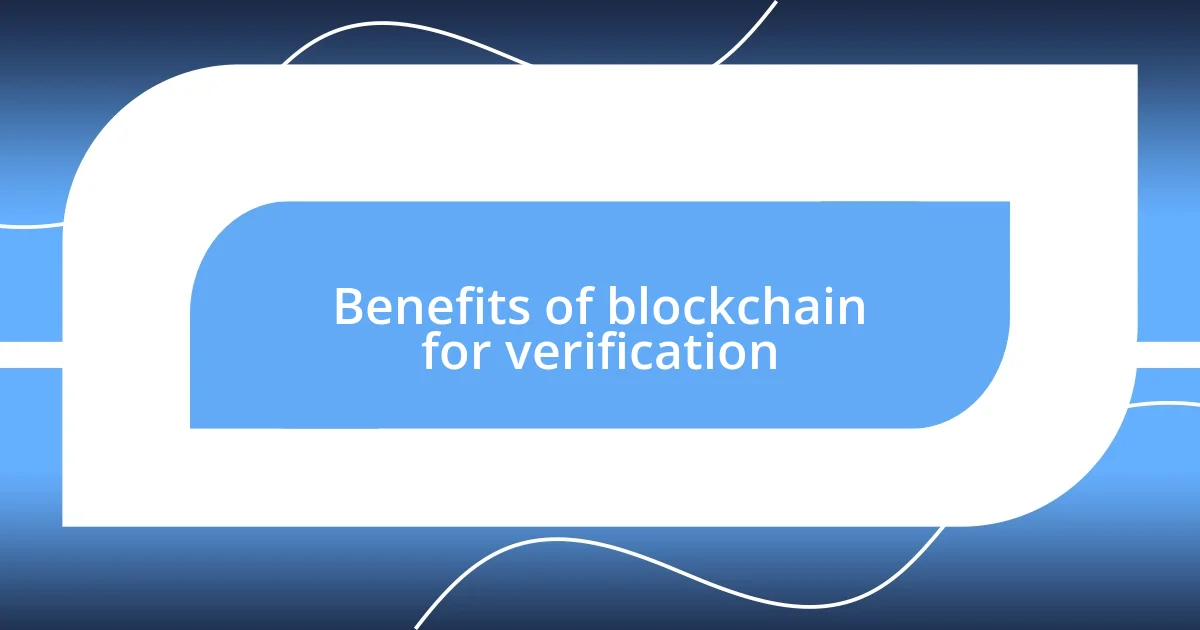
Benefits of blockchain for verification
Blockchain technology brings an array of benefits for verification processes, particularly in enhancing trust and security. One standout aspect is the transparency it offers. Every transaction is recorded on a public ledger, which allows all parties to verify the information independently. I vividly recall attending a conference where the organizers used blockchain for attendee verification. Being part of an event where everyone’s identity could be confirmed effortlessly gave me peace of mind—I felt secure, knowing that my data was safeguarded against manipulation.
Another remarkable benefit is the reduction of administrative costs and time. Traditional verification methods often involve cumbersome paperwork and back-and-forth communication. A few months ago, I participated in an event that incorporated blockchain for ticket validation. The process was instantaneous! I saw attendees breezing through the check-in point, reducing waiting times significantly. It was eye-opening to witness how technology could streamline tasks that once consumed so much time.
Finally, there’s the aspect of fraud prevention. With blockchain’s immutable record-keeping, any attempt at falsifying data would be immediately detectable. I remember a story I heard about a music festival that used blockchain to combat ticket scalping. The organizers could track the original sale and ownership of each ticket, allowing them to ensure that none were being illegally resold. This not only protected attendees but also fostered a more genuine and trustworthy environment. It felt like a breath of fresh air, knowing event organizers were so dedicated to the integrity of their event.
| Benefit | Description |
|---|---|
| Transparency | Records are visible to all parties, enhancing trust. |
| Cost Reduction | Streamlined verification minimizes administrative time and expenses. |
| Fraud Prevention | Immutable records help detect and deter fraudulent activities. |
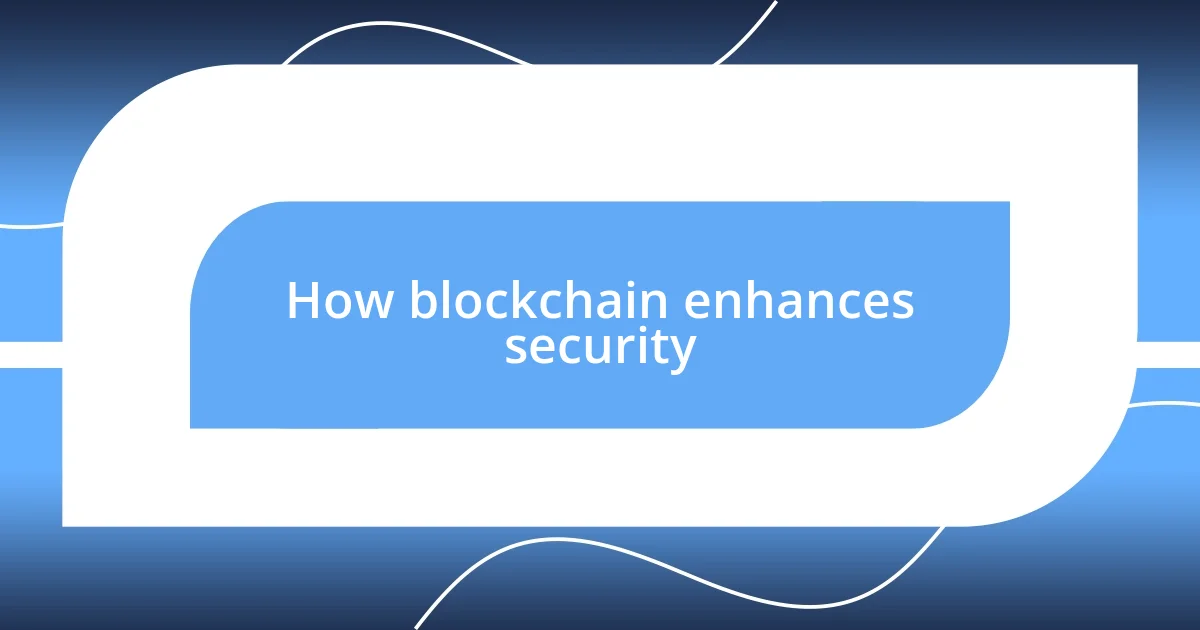
How blockchain enhances security
The security advantages of blockchain come from its fundamental structure. Because it operates on a decentralized network, there’s no single point of failure. I recall a moment at a tech meetup where the discussion turned to security; someone shared how eliminating central databases could reduce the risk of massive data breaches. That struck a chord with me. With blockchain, even if one part of the system is compromised, the rest remains secure, offering a robust defense against external threats.
- Decentralization: Data is spread across a network, preventing a single point of attack.
- Immutable Records: Changes are almost impossible, which makes tampering evident.
- Enhanced Privacy: Participants can control which data they share, ensuring personal information remains secure.
When I use blockchain for attendee verification, I often think about how it empowers individuals. For example, at a seminar, I witnessed the reassurance on attendees’ faces as they provided their credentials, confident that their identity was protected. It’s not just about securing data; it’s about creating a sense of safety and trust. Seeing people able to verify their identities seamlessly reminded me of how vital security is in our increasingly digital world.
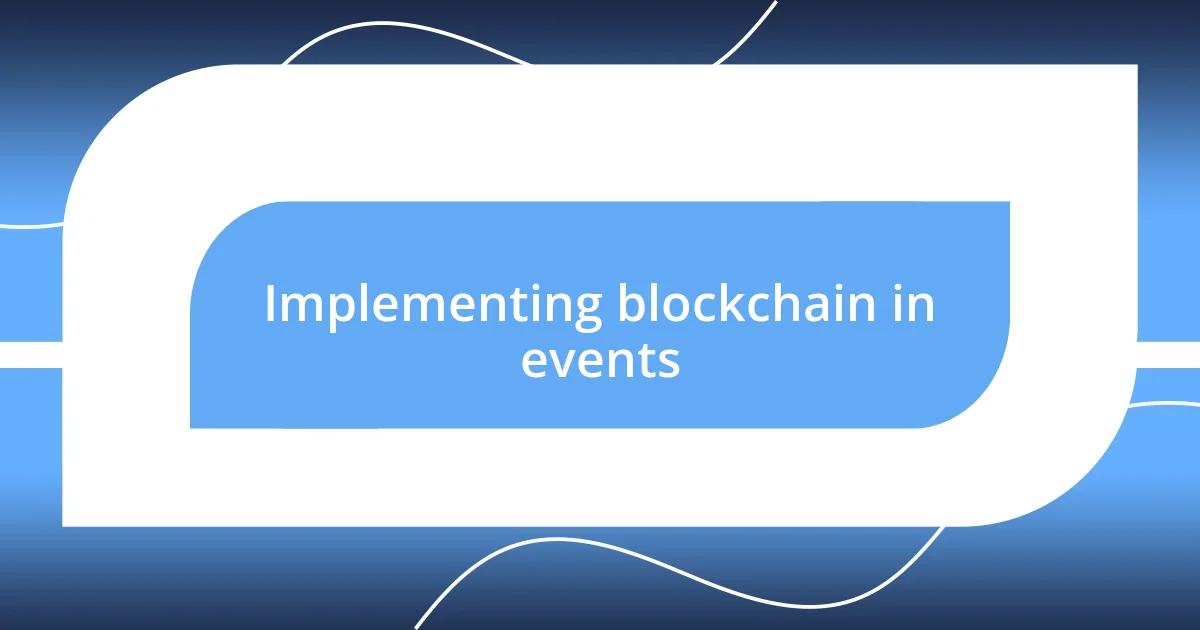
Implementing blockchain in events
Implementing blockchain in events opens up a world of efficiency that I never thought possible. I remember attending a seminar where the organizers transitioned from traditional to blockchain-based verification. It was remarkable to see how quickly the entire process sped up. The moment I stepped into the venue, my digital ID was verified in seconds. I couldn’t help but wonder why more events weren’t leveraging this technology to enhance the attendee experience.
Consider the potential for personalization and engagement. At a recent festival where blockchain was integrated, I noticed how the platform allowed for tailored interactions. Attendees could receive custom confirmations, updates, and exclusive content based on their interests. I found myself reflecting on how this made communication feel more personal and meaningful. What if every event could provide this level of care for its participants?
Moreover, I’ve noticed that implementing blockchain solutions can build stronger connections between organizers and attendees. When I met the event coordinators at a conference that utilized blockchain, they shared how they could gather valuable insights about attendee behavior while still prioritizing privacy. This balance struck me as incredibly thoughtful. It poses an interesting question: Could blockchain be the key to fostering more genuine relationships in the event industry? I truly believe it has the potential to reshape how we connect at events, making every interaction feel more authentic and intentional.
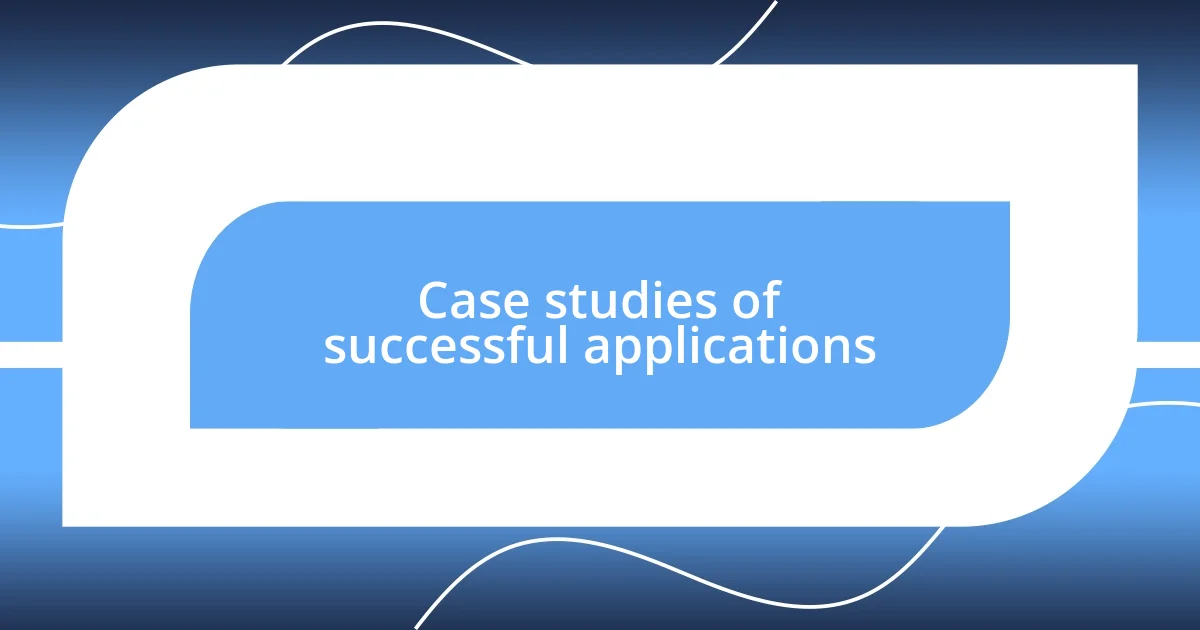
Case studies of successful applications
One standout case that comes to mind is the use of blockchain technology during a recent international music festival. In this instance, the organizers integrated a blockchain-based ticketing system to prevent counterfeiting. Imagine the relief I saw on a friend’s face when she learned that her digital ticket was registered on a public ledger. Not only does this eliminate the stress of fake tickets, but it also safeguards the financial investments of genuine attendees. This real-life application made me realize how critical trust is in large-scale events.
Another fascinating example comes from a tech conference that I attended, which employed blockchain for real-time attendee verification. As I walked through the entrance, my identity was confirmed through a smart contract, allowing me immediate access without waiting in long lines. I couldn’t help but feel a sense of empowerment as I breezed past others still fumbling with their paper tickets. It raises a thought: how much more enjoyable could our event experiences be if every gathering embraced this level of efficiency?
Finally, at a virtual summit I participated in, blockchain enabled organizers to not only verify identities but also to track attendee engagement. They used this data to curate custom sessions that resonated with participant interests. After attending a few of these tailored conversations, I was struck by how much more valuable and engaging these interactions felt. I found myself asking, isn’t it time we leverage technology to make every event more tailored and impactful for attendees? The possibilities seem endless with blockchain at our fingertips.
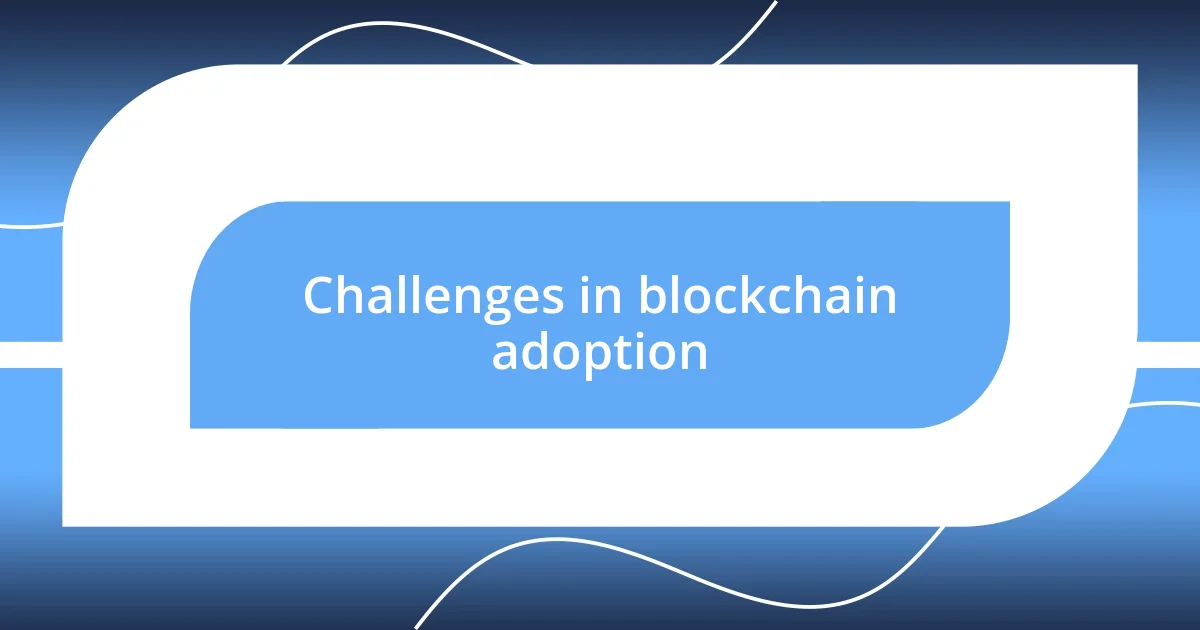
Challenges in blockchain adoption
When it comes to blockchain adoption, one significant challenge I’ve observed is the steep learning curve associated with the technology. I remember attending a workshop where attendees struggled to grasp how blockchain works, often getting lost in the jargon. It made me realize that without proper education and training, many event organizers may hesitate to implement this innovative solution. Who wants to dive into something they don’t fully understand?
Another hurdle I’ve encountered is the issue of scalability. At an event I attended, the organizers were excited about using blockchain for verification, but they faced difficulties managing the influx of thousands of attendees. As we waited in line, I couldn’t help but think: while blockchain can streamline processes, how do we ensure it can handle large crowds without glitches? It’s a crucial consideration for anyone thinking about implementing this technology at their events.
Trust is also a major concern. A colleague once shared his apprehension about data privacy when we discussed using blockchain for attendee verification. Despite its secure nature, the hesitation around sharing personal information on a blockchain system can deter potential users. I found myself pondering: how can we bridge this gap and educate attendees about the benefits without overwhelming them? A transparent approach might just be the key to alleviating these concerns and fostering a more confident embrace of blockchain in the event space.

Future trends in attendee verification
The future of attendee verification is increasingly moving toward personalized experiences. I remember attending an event where they utilized advanced biometrics for identity verification. Instead of scanning a ticket, my face was recognized at the entrance, making me feel both cutting-edge and somewhat like a spy in a tech thriller. This level of personalization not only enhances security but also creates a seamless experience. I can’t help but wonder how many more events could adopt such innovations, personalizing and streamlining entry for every attendee.
Moreover, I foresee more integration of artificial intelligence with blockchain for more nuanced attendee verification. At a recent conference, I overheard organizers discussing how AI could analyze attendee behavior and preferences alongside blockchain data. This could lead to real-time adjustments in event programming, tailoring content to fit audience interests. It strikes me that with these advancements, events could cater to us more effectively, enhancing our enjoyment and engagement. Wouldn’t it be incredible to attend an event that knows exactly what you want, simply because it’s anticipated your needs?
Lastly, I find the idea of decentralized ecosystems for attendee verification fascinating. Imagine a scenario where instead of relying on a single entity, multiple organizations collaborate using blockchain for verification processes. During one of my experiences, I distinctly felt the limitations of a centralized system during security checks. With decentralization, I believe everyone would benefit from improved efficiency and trust. This shift could redefine not only how we check-in but also how we view the integrity of our data and experiences at events. Isn’t it exciting to think that the future could offer us more power over our information as we enjoy our time at gatherings?












